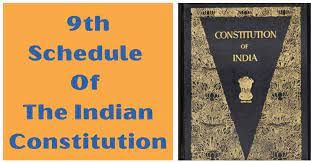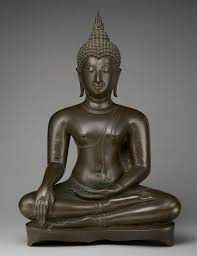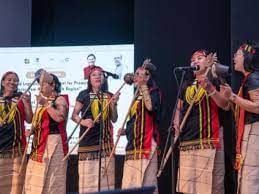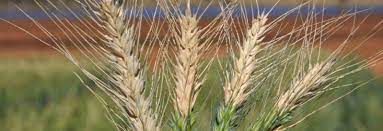UPSC Daily Current Affairs- 19th April 2023 | Current Affairs & Hindu Analysis: Daily, Weekly & Monthly PDF Download
GS-I
Buddhism
Why in News?
India will be hosting a two-day international Buddhist conference soon.
About Buddhism:-
- Buddhism is based upon the teachings, and life experiences of its founder Siddhartha Gautam, born circa 563 BCE.
- Buddha asked his followers to avoid the two extremes of indulgence in worldly pleasure and the practice of strict abstinence and asceticism.
- He ascribed instead the ‘Madhyam Marg’or the middle path which was to be followed.
- Four noble truths of Buddhism are: They are the truth of suffering, the truth of the cause of suffering, the truth of the end of suffering, and the truth of the path that leads to the end of suffering.
- The path to nirvana is the Noble Eightfold path– Right Understanding (Samma ditthi), Right thought (Samma sankappa), Right speech (Samma vaca), Right Action (Samma kammanta), Right livelihood (Samma ajiva), Right effort (Samma vayama), Right mindfulness (Samma sati) and Right concentration (Samma samadhi)
Buddhist Councils:-
There were four Buddhist Councils. They are as follows:-
First Buddhist Council:-
- Venue: In Sattaparnaguha Cave situated outside Rajgriha (the modern city of Rajgir).
- Year: 486 BC.
- King: Ajatasatru, son of King Bimbisara (Haryanka Dynasty).
- Presiding Priest: Venerable Maha Kasyapa with 500 monks.
- Resulted in:-
- Vinaya Pitaka which mainly contains the rules of the Buddhist order.
- This was recited by
- Suttapitaka was recited by
- It contains the great collections of Buddha’s sermons on matters of doctrine and ethical beliefs.
- Vinaya Pitaka which mainly contains the rules of the Buddhist order.
Second Buddhist Council:-
- Venue: Vaishali
- Year: 386 BC
- King: Kalasoka (Shisunaga Dynasty).
- Presiding Priest: Sabakami
- resulted in the split of the Buddhist order into Sthaviravadinis(Theravada) and Mahasanghikas.
Third Buddhist Council:-
- Venue: Pataliputra (today’s Patna).
- Year: 250 BC.
- King: Ashoka (Maurya Dynasty).
- Presiding priest: Mogaliputta Tissa (Upagupta).
- Resulted in:-
- Made Sthaviravada School an orthodox school which is believed that the past, present, and future are all simultaneous.
- Codification of Abhidhamma Pitaka, dealing with Buddhist philosophy written in Pali.
Fourth Buddhist Council:-
- Venue: Kundalavana, Kashmir.
- Year: 72 AD
- King: Kanishka (Kushan Dynasty)
- Presiding Priest: Vasumitra; deputed by Asvaghosha.
- Resulted in:-
- Sarvasthivada doctrines were organized into three large commentaries on the Pitakas.
- Final division of Buddhism into Mahayana & Hinayana sects.
Source: The Hindu
Galapagos Islands
Why in News?
Recently, a scientific expedition has discovered a previously unknown coral reef with abundant marine life off Ecuador's Galapagos Islands.
About Galapagos Island:
- Location: It is situated in the Pacific Ocean some 1,000 km from the Ecuadorian coast.
- It is distributed on either side of the Equator with an underwater wildlife spectacle with abundant life.
- Geology of the Island:
- It begins at the sea floor and emerges above sea level where biological processes continue.
- Three major tectonic plates Nazca, Cocos and Pacific meet at the basis of the ocean, which is of significant geological interest.
- In comparison with most oceanic archipelagos, the Galapagos are very young with the largest and youngest islands, Isabela and Fernandina, with less than one million years of existence, and the oldest islands, Española and San Cristóbal, somewhere between three to five million years.
- It is designated as a UNESCO World Heritage site in 1978.
- Mount Azul at 5,541 feet is the highest point of the Galapagos Islands.
Key facts about Coral Reefs
- Corals are marine invertebrates or animals not possessing a spine.
- Each coral is called a polyp and thousands of such polyps live together to form a colony, which grows when polyps multiply to make copies of themselves.
- Corals share a symbiotic relationship with single-celled algae called zooxanthellae.
- The algae provide the coral with food and nutrients, which they make through photosynthesis, using the sun’s light.
- In turn, the corals give the algae a home and key nutrients. The zooxanthellae also give corals their bright colour.
Source: The Hindu
GS-II
Marketing and Logistics Development for the Promotion of Tribal Products from North -Eastern Region (PTP-NER)
Why in News?
Recently, the Ministry of Tribal Affairs, Government of India has introduced a new scheme “Marketing and Logistics Development for Promotion of Tribal Products from North -Eastern Region (PTP-NER)”.
About Marketing and Logistics Development for Promotion of Tribal Products from North-Eastern Region (PTP-NER):-
- The scheme is for the benefit of Scheduled Tribes of the Northeastern Region.
- It has the vision to strengthen livelihood opportunities for tribal artisans through increased efficiency in procurement, logistics and marketing of tribal products from North Eastern States.
- The scheme will apply to the states of Arunachal Pradesh, Assam, Manipur, Meghalaya, Mizoram, Nagaland, Tripura and Sikkim.
- The scheme shall be launched by Ministry for Tribal Affairs.
- The scheme PTP-NER will facilitate tribal artisans to avail opportunities of enhancing income through the provision of backward and forward linkages through incubation support, aggregation, skill and entrepreneurship development, sourcing and procurement, marketing, transportation and publicity.
- As a part of this scheme, it is planned to initiate empanelment of tribal artisans from the North Eastern Region by organizing 68 Tribal Artisan Melas (TAMs) w.e.f. 18.04.2023 onwards during the month of April –May 2023 at various districts of the Northeastern Region.
- TRIFED, the nodal agency under the Ministry of Tribal Affairs, continues to strive in endeavours to improve the quality of life of the tribal people, while preserving their age-old traditions.
Source: PIB
The future of India’s civil society organizations

Why in News?
Central government has been accused of weakening India’s civil society organizations (CSO) both in the pre legislative stage and in the redress of lacunae in the implementation of government schemes.
About civil society organizations:
- According to the World Bank: “Civil society refers to a wide array of organizations: community groups, non-governmental organizations [NGOs], labor unions, indigenous groups, charitable organizations, faith-based organizations, professional associations, and foundations.”
- When mobilized, civil society sometimes called the “third sector” (after government and commerce) -has the power to influence the actions of elected policy-makers and businesses.
- But the nature of civil society – what it is and what it does – is evolving, in response to both technological developments and more nuanced changes within societies.
- Examples of well-known civil society organizations:
- Amnesty International,
- International Trade Union Confederation
- World Wide Fund for Nature (WWF)
- Greenpeace
- The Danish Refugee Council (DRC),
- Reporter without boarder
Role of CSOs:
- Plugging the Implementation Gap: NGOs play important role in the promotion and implementation of important rights-based legislation such as RTI, FRA 2006, RTE 2010, and the MGNREGA.
- Support for sectors untouched by the state: Providing aid to migrants, human and labour rights, Tribal welfare (Nilgiris Wynaad Tribal Welfare Society (NWTWS)), Women advocacy (ActionAid India, Sewa, Eklavya, Sathin, Disha work for women empowerment).
- Promotes community-based organizations such as SHG, and Farmer’s organizations: these organizations are critical in bringing about changes at the grass-roots level
- Work as Pressure Group: NGOs mobilize people for their rights as well as educate communities against harmful policies of government e.g. Narmada Bachao Andolan work for the rights of displaced people.
- Bring about behavioural changes: NGOs work against superstition, false faith, Beliefs, and Customs e.g. Maharashtra Andhashraddha Nirmulan Samiti (MANS); or Committee for Eradication of Blind Faith, CEBF).
- Promoting Environmentalism: e. Green Peace, Vanashakti NGO, etc.
Civil Society in India:
- The third sector / civil society organisations promote cooperation between two or more individuals through mutual cohesion, common approach and networking. Democracies inherently encourage such cooperative behaviour.
- The Indian Constitution too explicitly recognizes “right to freedom of speech and expression and to form associations or unions” as one of the core rights of its citizens under Article 19(1) and hence encourages formation of civil society groups and community organisations.
- In the current model of economic growth, the voluntary/ civil society sector has been recognized as a key player in achieving equitable, sustainable and inclusive development goals.
- Both the State as well as the market-led models of development have been found to be inadequate and there is an increasing realisation that active involvement of the voluntary sector is needed in the process of nation building.
- Civil Society plays a crucial role in the good governance.
- As India is not a participative democracy but a representative democracy, government takes all major decisions by itself.
- Civil Society act as interface of interaction between the government and the governed.
Challenges:
- The challenge is multidimensional, and is compounded by the ‘unorganised’ nature of the sector, lack of regulatory frameworks and the fact that India boasts of more than a million NGOs of different roles, structures and sizes.
- The general lack of transparency in the functioning of a large proportion of civil society organisations leads to aversion in donating funds for charitable causes since the general public is largely cynical about the ‘genuineness’ of the non-profit spirit of the sector.
- Recently, the Union Home Ministry has identified some NGOs as security threat to the country.
- Such security considerations have underscored the rising need of improving the governance practices in the Indian NGOs and exercising better regulatory mechanisms, disclosure norms, and management processes including financial management and budgeting systems as well.
- Recently decades have seen a spurt in civil society organizations across the country; Many of them do not server the larger interests of society such as lobbying for industrial groups or foreign nations by advocating a policy.
Need of realignment:
- Because of the financial and structural constraints imposed on them, CSOs/movements are bleeding conscientious youngsters, who naturally need some financial sustenance.
- Without sustained support, CSOs cannot positively mould public discourse or make a tangible impact on the nation at large.
- With governments consciously avoiding CSOs/movements, their ability to shape policy is diminished which adversely impacts organisational morale.
Way Forward:
Civil society that can be subverted, suborned, divided, manipulated to hurt the interests of a nation. So there is need to civilize civil society in the promotion of “good governance” civil society can play an important role in reforming the state in the badly governed countries and through interrogation and collaboration can help promote democracy, rule of law and social justice.
Source: The Hindu
Ninth Schedule

Why in News?
Recently, Chhattisgarh Chief Minister wrote to Prime Minister seeking the inclusion of two amendment Bills in the Ninth Schedule of the Constitution.
About Ninth Schedule:-
- The Ninth Schedule contains a list of central and state laws which cannot be challenged in courts.
- They are shielded from judicial review.
- The Schedule became a part of the Constitution in 1951 when the document was amended for the first time.
- It was created by the new Article 31B, which along with 31A was brought in by the government to protect laws related to agrarian reform and for abolishing the Zamindari system.
Article 31A
- It extends protection to ‘classes’ of laws,
Article 31B
- It shields specific laws or enactments.
- Article 31B also has a retrospective operation
- It means if laws are inserted in the Ninth Schedule after they are declared unconstitutional, they are considered to have been in the Schedule since their commencement, and thus valid.
- Although Article 31B excludes judicial review, the apex court has said in the past that even laws under the Ninth Schedule would be open to scrutiny if they violated fundamental rights or the basic structure of the Constitution.
Supreme Court and I R Coelho v. State of Tamil Nadu (2007):
- It was held that every law must be tested under Article 14, 19 and 21 if it came into force after 24th April 1973.
- In addition, the court upheld its previous rulings and declared that any act can be challenged and is open to scrutiny by the judiciary if it is not in consonance with the basic structure of the constitution.
- In addition, it was held that if the constitutional validity of any law under the ninth schedule has been upheld before, in future it cannot be challenged again.
Chattisgarh legislative assembly bills:-
- Two amendment Bills that pave the way for a 76% quota for Scheduled Caste, Scheduled Tribes and Other Backward Classes were passed unanimously by the State Assembly last December.
- The two bills are Chhattisgarh Public Service (Scheduled Caste, Scheduled Tribes and Other Backward Classes Reservation) Amendment Bill and Chhattisgarh Educational Institutions (Reservation in Admission) amendment bill
- It is related to quota in government jobs and admission in educational institutions in proportion to the population of different categories in the state, he said.
- This increased reservation for OBCs to 27% from the existing 14%, while for the SC community to 13% from 12% in the public employment and admissions.
- The 32% reservation for the ST category was kept unchanged.
- Besides, a provision of 4% reservation was also provided to the Economic Weaker Section (EWS), taking the total extent of the reservation to 76%.
- However, the bills are pending with the Governor for assent.
Source: The Hindu
GS-III
Wheat Blast
Why in News?
Recently, scientists have warned that the fungus Magnaporthe oryzae, which is destroying South American wheat crops, could spread worldwide.
About Wheat Blast:
- What it is? It is a fungal disease in tropical and subtropical wheat production regions caused by Magnaporthe oryzae.
- The fungus infects wild and cultivated grasses, most notably rice and wheat.
- It spreads through infected seeds, and crop residues as well as by spores that can travel long distances in the air.
- The crop fungi are known to mutate and adapt to new conditions
- History of the outbreak of this disease
- Researchers first detected this pathogen in Brazilian wheat crops in the 1980s.
- Asia’s first outbreak of this pathogenic wheat blast was reported in Bangladesh in 2016.
- Two years later, an outbreak of this fungus was detected in wheat crops in Zambia, which was the first time the pathogen was detected in Africa.
Key Facts about Wheat
- It is the second most important cereal crop in India after rice.
- It is a Rabi crop which requires a cool growing season and bright sunshine at the time of ripening.
- Temperature: It requires 10-15°C (at the time of Sowing) and 21-26°C during Ripening & Harvesting.
- Rainfall: Around 75-100 cm.
- Soil required: Well-drained fertile loamy and clayey loamy.
Source: The Hindu
Limited Purpose Clearing Corporation
Why in News?
Recently, the Securities and Exchange Board of India (SEBI) put in place a dispute resolution mechanism for Limited Purpose Clearing Corporation (LPCC) to settle disputes and claims arising out of transactions cleared by it.
About Limited Purpose Clearing Corporation:
- It is an entity established to undertake the activity of clearing and settlement of repo transactions.
- The mechanism will be used
- To settle disputes between clearing members;
- Contention between the clearing members and their clients
- Differences between the LPCC and its vendors
- Disputes between clearing members or its clients and the LPCC.
- The disputes arising between clearing members of the LPCC will be settled by conciliation and/or by an arbitration panel consisting of three clearing members, other than the clearing members who are party to the dispute.
- The decision of the arbitration panel would be final and binding on the parties.
- In case a clearing member or the LPCC is not satisfied then the disputes would be resolved under the procedure laid down in the Payment and Settlement Systems Act, 2007.
Source: Business Standard
|
38 videos|5258 docs|1111 tests
|
FAQs on UPSC Daily Current Affairs- 19th April 2023 - Current Affairs & Hindu Analysis: Daily, Weekly & Monthly
| 1. What are the three papers in the UPSC examination? |  |
| 2. What is the significance of General Studies Paper I in the UPSC examination? |  |
| 3. Which subjects are covered in General Studies Paper II of the UPSC examination? |  |
| 4. What are the topics included in General Studies Paper III of the UPSC examination? |  |
| 5. How can candidates prepare for the General Studies papers in the UPSC examination? |  |


























